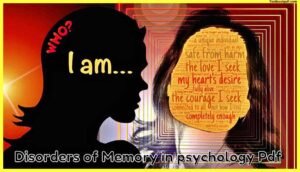Disorders of Memory in psychology Pdf Download
In disorders of memory, we will talk about Amnesia and its two major divisions- Organic and psychogenic amnesia, Disorders of Memory in psychology Pdf Download, It broadly covers Alzheimer’s disease, Korsakoff syndrome, Herpes simplex encephalitis, temporal lobe surgery, and post-ECT amnesia. Amnesia in long-term memory- anterograde and retrograde Amnesia and we will talk about intact and impaired memory systems and their causes. Theories of Amnesia covers-encoding deficit theory, retrieval deficit theory, model of consolidation, and multiple trace theory.
The latter part of the article covers, other types of memory disorders such as impairments in short-term memory, concussion memory, ECT & memory loss, and frontal lobe lesions. We will talk about maximizing memory performance and the usage of external memory aids for memory rehabilitation purposes.
We have been in the last article talked about disorders we first visited disorders of attention and perception today we will be talking about disorders related to memory you have seen we spent a considerable amount of time talking about the organization of memory talking about how memory is an important cognitive function if you remember one of the earliest articles Jerry Fodor and Gaul also say for example thought of memory as a horizontal function that kind of applies to most mental operations that people would do so disorders of memory and reading about disorders of memory is that important and it is important in that respect so let us begin talking about disorders of memory.
AMNESIA
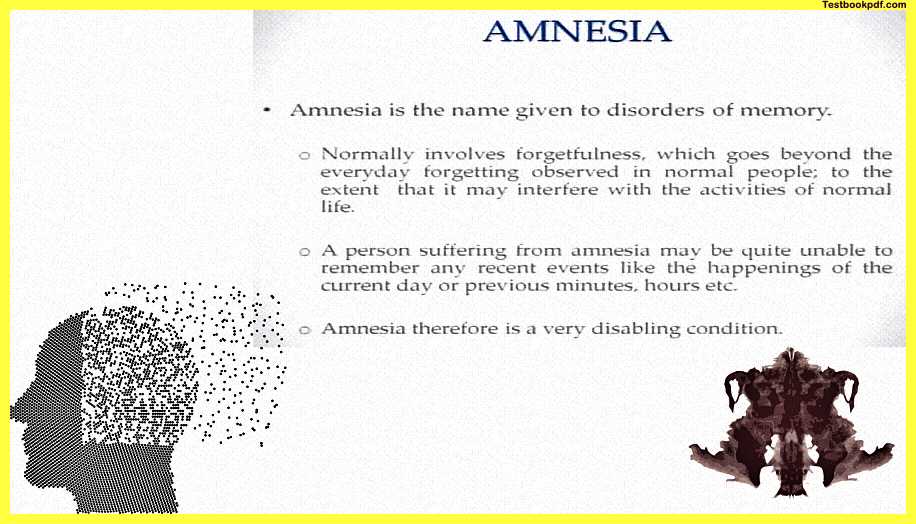
Now the general name given to disorders of memory is the name amnesia. amnesia typically involves forgetfulness which goes beyond the daily everyday forgetting you might keep your keys somewhere and forget it you might keep your book somewhere and forget it you might forget the name of a particular person that you meeting or the face of this person or a particular concept that you learned in the class but all of these kinds of forgetfulness are rather normal and happen to almost everybody when I am talking of amnesia I am talking of forgetfulness that goes beyond this general level of forgetting.
So forgetting in normal people is observed in everybody but we are talking about forgetfulness that is going beyond this part going to the extent that it starts interfering with the daily activities of people you started from your home to go to your office or your workplace or your school and during the way you kind of forgot where the office is this kind of extensive forgetfulness might be quite disabling a person suffering from Amnesia might quite be unable to remember any recent events like the happenings of the current day like happenings of the previous day also say for example in some cases they might not remember who they are whatever they have been experiencing over the past decade or so maybe two decades three decades something like that amnesia, therefore, can be a very disabling condition it can probably make the person dependent on a caregiver or a caretaker for the rest of their lives so Amnesia is, therefore, a rather serious disorder.
Causes of Amnesia
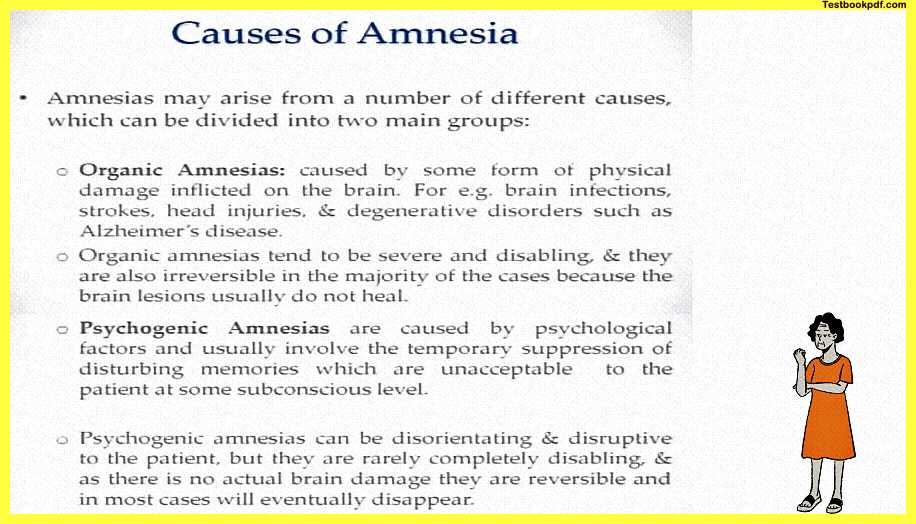
Now amnesia this class of disorders of memory can arise out of a number of causes there might be a lot of reasons various reasons that could lead to amnesia the first class or the more severe reason of amnesia could be organic amnesia.
Organic Amnesia
Now organic amnesia is basically caused by a number of physical damage to the brain and those physical damages could be infections meningitis encephalitis those kinds of things strokes head injuries or degenerative disorders such as Alzheimer’s disease, organic amnesias generally tend to be rather severe, and disabling and they are also irreversible in nature because any damage to the parts of the brain is irreversible generally these injuries would not heal the infect the effects of the infection on the brain will not go away and in that sense, the amnesia will be rather permanent in nature.
Psychogenic Amnesias
Now there could be psychogenic amnesias as well psychogenic amnesias are caused by psychological factors such as depression increased tension etc these will involve the temporary suppression of disturbing memory somebody might not have gone through a particular brain injury but might have gone through a very traumatic episode in their lives and because of the shock and because of the highly emotionally charged nature of that particular event the person chooses unconsciously or subconsciously to suppress that event and that kind of the memory of that entire event goes away this will be an example of the psychogenic amnesias.
Now psychogenic initiates can also be rather disruptive and disorienting to the patient but they are rarely completely disabling they are not really as pervasive as the organic amnesia as we have been talking about now the psychogenic amnesias because there is no brain damage involved are also generally reversible after an adequate amount of medication or counseling or some kind of rehabilitative therapy and they would eventually with the course of time disappear completely as well so we talked about organic amnesia we talked about psychogenic ignitions they could also be in the middle we could just talk about four kinds of organic amnesia that may be.
Now the first kind of organic amnesia is basically Alzheimer’s disease.
Alzheimer’s disease
Alzheimer’s disease is a degenerative brain disorder that first appears as an impairment of memory and generally increased forgetfulness but it later develops into more general dementia, so patients suffering from the alzheimer’s disease might not only have disorders or problem with memory but they might have problems with decision making orienting themselves and other related disorders which are basically linked with the frontal lobes of the brain alzheimer’s disease happens mostly in the senile population affecting up to about 20 percent of the elderly from age groups of above 50 55 to higher ages alzheimer’s disease is a neurodegenerative disorder which basically involves the tangling of neuronic fibers something which has been shown to be responsible for other kinds of senile dementia as well so this is something which is brought on by age its it is a degeneration of areas of the brain tangling of the neuronal fibers and has been linked to other kinds of dementia wherein basic cognition aspects are lost as well now because of the overlap with symptoms of general dementia alzheimer’s disease cannot be considered to be a pure form of amnesia it’s not really a disorder only in memory is a disorder of memory plus some kind of decision making process plus some kind of attention and difficulties and so on, so that is why its it is that much more difficult to investigate the nature of memory loss in alzheimer’s disease another kind of an organic amnesia is basically caused or named as the caustic of syndrome.
Korsakov syndrome
Now Korsakov syndrome is basically a brain disorder that results from excessive alcoholism and is characterized by a memory impairment that affects both recent and past memories it was first reported by Korsakov in 1987 and is one of the most studied forms of amnesia.
Now it’s not really marred by additional complications of any extensive dementia or mental retardation or anything so it is a pure disorder of memory it is caused by alcoholism some damage to the parts of the brain which we will see later but it is purely a disorder of memory that is why a purely disorder that can be classified as pure amnesia.
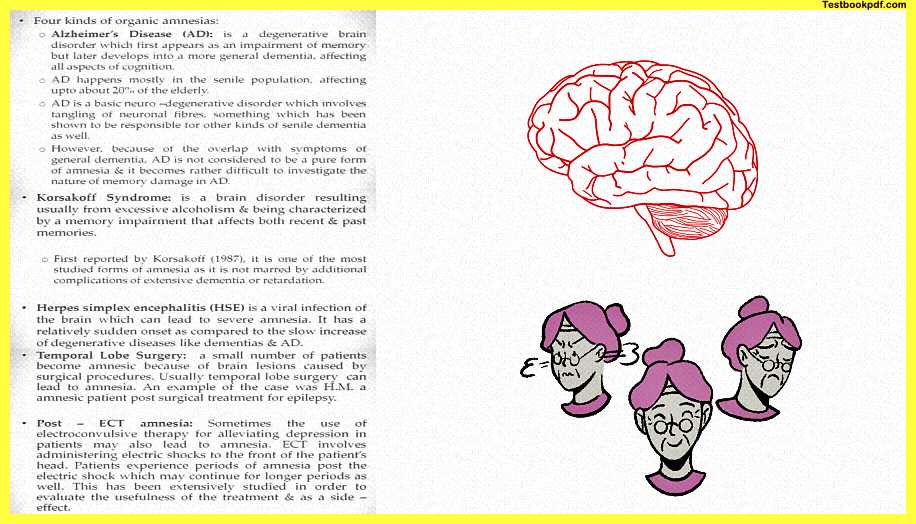
Herpes simplex encephalitis (HSE)
Now there is also another cause of organic initials which is known as Herpes simplex encephalitis, it is a viral infection of the brain that can result in severe amnesia it is basically characterized by a relatively sudden onset as compared to the slow onset of amnesia for example in the case of DJ Alzheimer’s disease also organic amnesia can be brought upon by surgical procedures typically surgery of the temporal lobes might lead to some kind of amnesias in a lot of cases and a typical example of this was the patient called henry Molaison.
We have talked about him in the past as well he is basically bilateral hippocampi were removed during a surgical procedure to relieve him from epilepsy but it resulted in vast amnesia of a particular kind that we will discuss in some short time another cause of amnesia could be posted electroconvulsive therapy amnesia now what happens is that in case of patients suffering from mental disorders or psychological disorders a lot of times you will see that people resort to the use of electroconvulsive therapy or shock treatment for alleviating the depression in these patients or which this might also lead to amnesia, So ECT basically involves administering an electrical shock to the front of the patient’s head and sometimes patients have reported having periods of amnesia post this electric shock.
Now, this also has been extensively studied to evaluate the usefulness of ECT for treating these depression patients.
Long-Term memory
now let us come to discussing these amnesias in slightly more detail and how these amnesias might affect one of the aspects of memory called long-term memory in one of the recent articles we have talked about how long-term memory autobiographical episodic and semantic is one of the kinds of memories that we mostly talk about and that we are most concerned with when we are talking about memory.
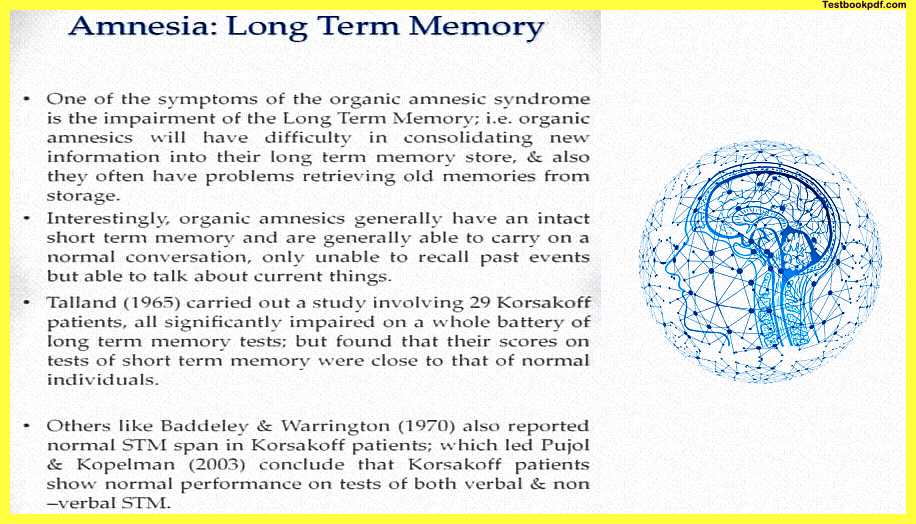
Now one of the symptoms of the organic amnesic syndrome is the impairment of long term memory that is organic amnestics will have difficulty in consolidating new information into their long term memory and you will also have problem in retrieving old or past long-term memories from their storage interestingly organic amnestics generally have an intact short-term memory and are generally able to carry out normal conversations you might not even notice that is there and that there is a problem with these individuals unless you start talking about things which have passed long ago or say for example you might discover that these people are not really remembering even things that happened minutes ago talent in 1965 carried out a study involving twenty nine kasich of patients all of them significantly impaired on a whole battery of long term memory tests but found that their scores on a short term memory test or test of the short term memory was almost as close to that of normal patients others like badly and warrington in 1970 have also reported normal short-term memory span in course of patients all of these kinds of studies led pujol and coppelmann in 2003 to conclude that corsica of patients show normal performance on tests of both verbal and non-verbal short-term memory so it tells you that amnesia can selectively affect and disabilitate the long-term memory of the participants by leaving intact the short-term memory and working memory concepts.
Two kinds of amnesia
Let us talk about two kinds of amnesia that one can talk about.
- Anterograde amnesia
- Retrograde amnesia
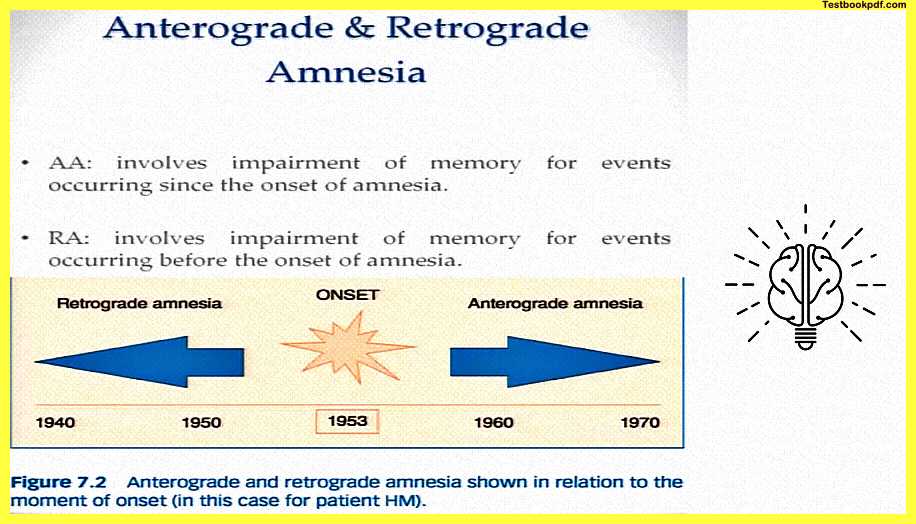
So anterograde amnesia is basically disability or impairment of memory for events that are happening post the onset of initiation so once let us say there is a point in time where somebody has the onset of amnesia everything after that will be very hard to retrieve in retrograde amnesia everything before the onset of amnesia will be very hard to retrieve so these are the two different and two major kinds of amnesia’s that one can actually talk about so hearing you can see so if there is an onset everything after the onset comes under anterograde amnesia everything before the answer comes under retrograde amnesia.
Now this distinction between anterograde and retrograde amnesia can provide a way of distinguishing the locus of amnesia as either a learning disorder or a retrieval disorder.
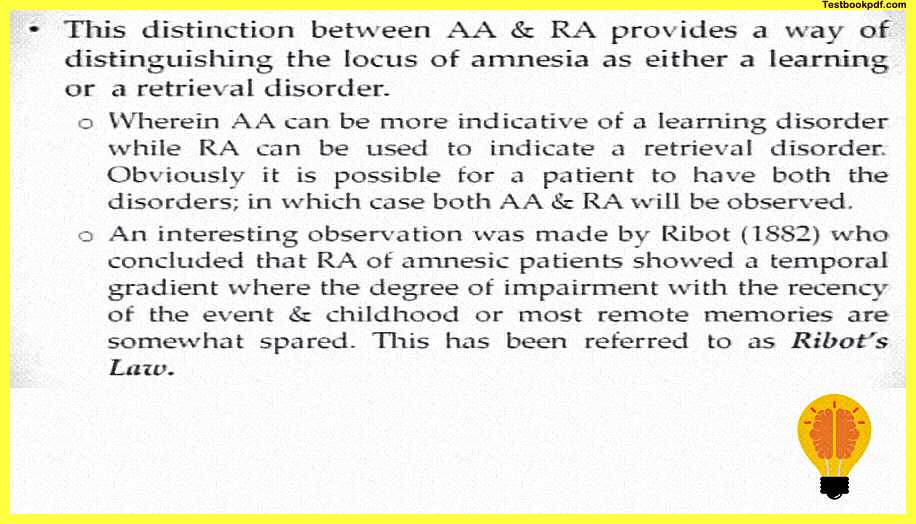
Now anterograde amnesia can be more indicate obviously a learning disorder well as retrograde amnesia can be used as an indication for retrieval disorder obviously it is possible for a patient to have both android and retrograde amnesia and in which cases you will say that both a a and r a are present in this particular patient an interesting observation that was made by Ribot in 1882 was that he concluded that the retrograde amnesia of these amnesic patients shows a typical temporal gradient wherein the degree of impairment kind of is inversely proportional to the recency of the event.
So the event is very recent the degree of impairment will be too high if the event is too long ago in the past the degree of the wave will be slightly lesser this relationship given by Ribot is also referred to as the Ribots law how do we test for these amnesias so if there is a cognitive disorder you would like to be able to test the patient test the presence of this cognitive disorder and test the extent of this disorder and consequently find out ways to help these patients so if you are trying to test anterograde amnesia its slightly easier because it is more of a learning disorder so you basically have to test whether the person can learn this new information or not and so you can give tests you can give new materials to the participant to learn over a period of time words pictures stories names faces whatever you might want to give then test their retrieval after a time gap of days or years or sometimes.
Testing Retrograde and Anterograde Amnesia
Now testing for retrograde amnesia becomes slightly more complicated as the testing has to be done for events that are events and materials that are not known to the tester himself so you cannot really test for a particular patient that what happened when you are 6 years old because the patient is not there because the tester it also does not know and cannot verify whether this person is telling the correct thing or not in one of the last articles you remember i have been talking about the constructive nature of memory so the constructive nature of memory might make it very difficult for an individual to be tested for retrograde amnesia because even though he might be remembering maybe an in a few strands of information from that particular time that you are asking him about but a lot of information might just be made up and that is very difficult to verify.
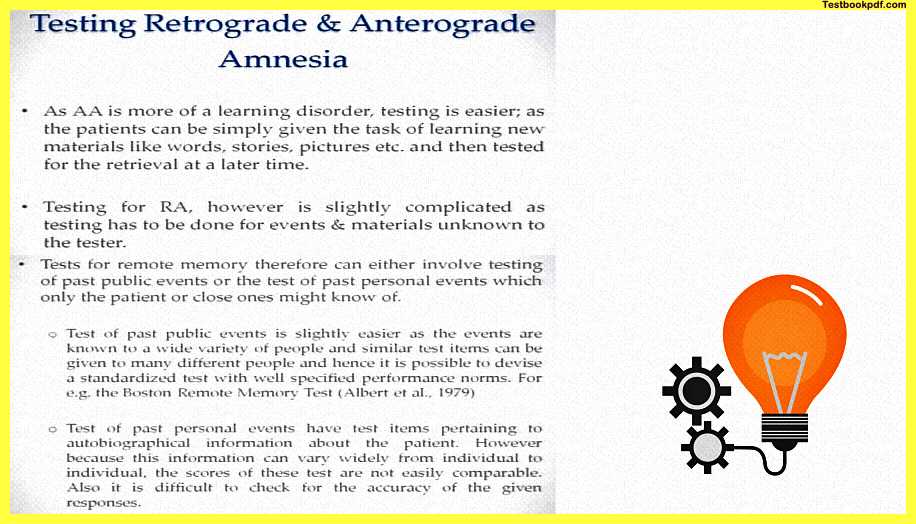
So what happens is a test for remote memory either involves testing of past public events or the test of past personal events in which only the patient or the close people of the patient there is a child and you ask the child about things that happen 10 15 20 years ago you can kind of verify those events with the help of the parents or the close relatives that would have been around that time so the test of past public events, by the way, is much easier because the events are known to a wide variety of people and similar test items can be given to many different people and their performance on these tests can be measured if there were 20 people around me and to each of them I basically asked them to relate what happened when India won the cricket world cup 2011. I can kind of compare the amount of information they would each recall about this particular event and I can cross verify and I can check whether they remember the details or not tests of past personal events are difficult for the exact same thing people cannot be tested for this autobiographical information unless there is somebody to verify it so however this information and also this information that we are talking about the past personal events may vary widely from person to person it becomes difficult therefore to test anybody for this information also it becomes as I mentioned already very difficult to verify the accuracy of the responses that the participants are giving.
Anterograde and Retrograde Impairment in Organic Amnesia
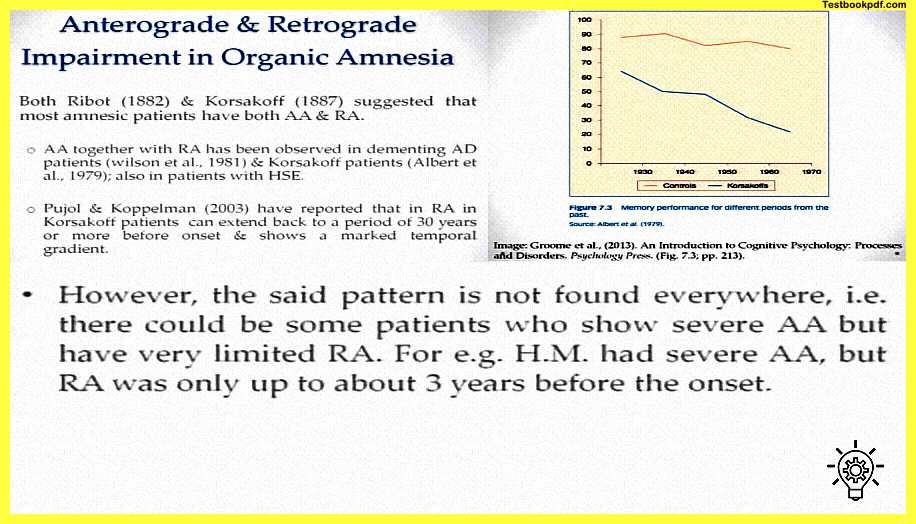
Now let us talk about more specifically anterograde and retrograde amnesia anterior and retrograde impairments so both ribot and kostakov suggested that most patients will manifest both anterior grid and retrograde amnesia if there is if they are experiencing organic causes anterograde amnesia together with retrograde amnesia has been observed in demanding alzheimer’s patients and caustic of patients also patients Herpes simplex encephalitis pivol and koppelman in 2003 have reported that in retrograde amnesia in kosice of patients can extend back up to 30 years or more before the onset of because before the onset of amnesia and it will also show a marked temporal gradient of the kind that ribot was mentioning under robert’s law here you can see this thing is a source from albert and colleagues the images from grooms book on cognitive psychology you can see this blue line that represents gossip of patients the impairment is much more for more recent events and the impairments are much higher for and the preservation is much higher for events that were much older so you see for events up to 40 years of old 40 years of age they the preservation of information is there but events that are as recent as 5 or 10 years old there is a marked impairment.
Now her the said pattern is not found everywhere so this is again one of the patterns that is reported but this pattern could not be found everywhere there could also be some patients who have severe anterior gradient amnesia but have very limited electrode amnesia h m had a very severe anterior degree of nature he would not form any long term memories after the surgery but his retrograde amnesia was only for up to three years prior to the onset now there have also been cases of focal retrograde and antelope amnesia few cases of focal anterior damnation without r a have been reported say for example myron colleagues in nineteen seventy nine they studied two caustic of patients who had focal antigrade amnesia and then cohen and square in nineteen eighty one also studied n a who was a patient who had focal anti-grade amnesia after a particular accident and his injuries and few other studies have confirmed that the damage in the focal androgen amnesia could be mostly restricted to the anterior thalamus so that might be the region which is involved in people learning new events and if that region is damaged selective or focal anti-degrade amnesia is possible to be observed focal retrograde retrogradementia cases are rather rare but some of the patients have also with severe head injuries and following epileptic seizures and ajc have been reported to have a focal retrograde emission as well now focal retrograde dementia has also been associated with lesions to various brain areas but most commonly it has been linked to lesions in the temporal cortex so that is one of the reasons which probably can be linked more to the long term memory than to the learning part of information.
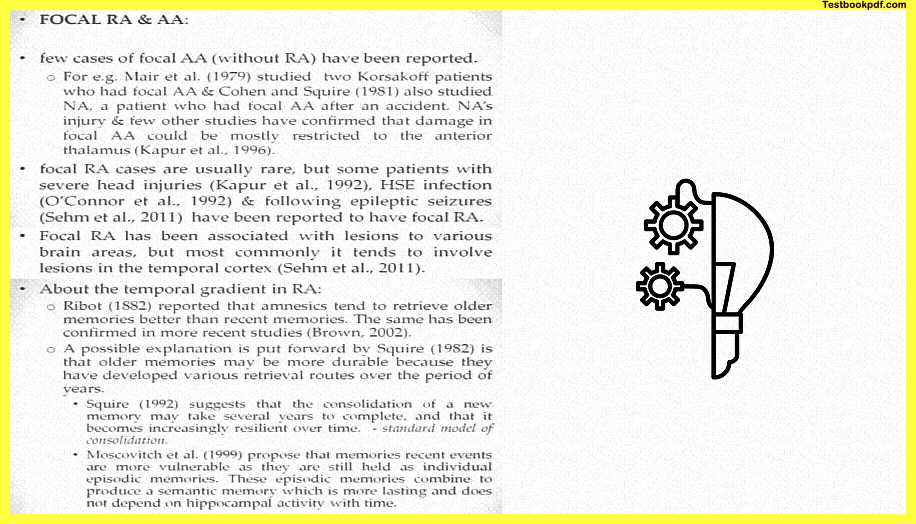
Now again coming and talking about this temporal gradient in retrograde amnesia Ribot in 1882 reported that amnesia tended to retrieve older memories much better than more recent memories the same was also been observed in more recent studies like that of brown in two thousand two a possible explanation put forward to explain this temporal gradient put followed by the square in 1982 is that older memories might be more durable because they have developed a variety of retrieval routes over periods of years if you remember what I have been talking about in the last part the narrative rehearsal hypothesis because older events have been gone over and over again you have retrieved particular information over and over again over a longer period of time you have given various kinds of cues you attach that information to too many sources of knowledge.
So that if one source of knowledge is absent if it is damaged you can still retrieve that information from other b or c sources of knowledge so squares suggest that the consolidation of a new memory might take several years to complete and that it becomes increasingly resilient over time so once something has become increasingly resilient over a period of 20, 30, 40 years it might be that that information is preserved even in cases of brain damage like organic amnesia so this model which square was talking about is called the standard model of consolidation.
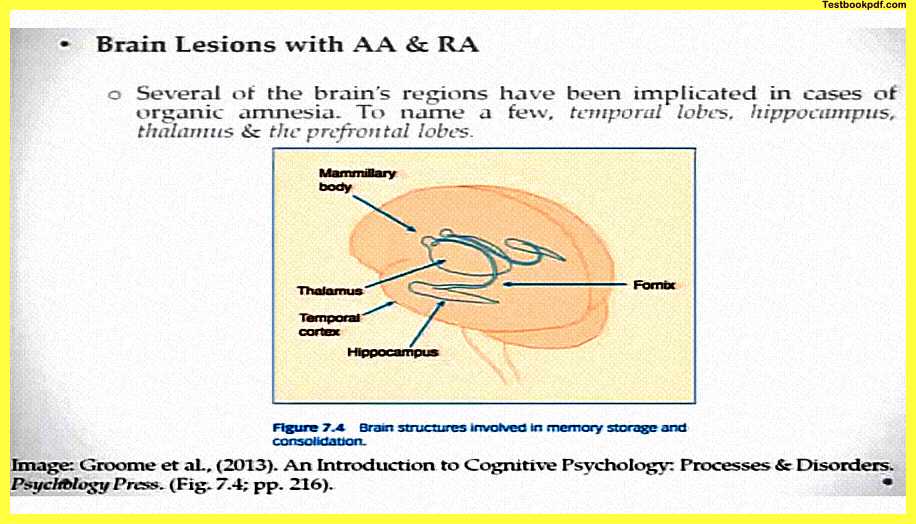
We will talk about this in more detail as we go ahead Moscow vision colleagues propose that memories of recent events are more vulnerable and are still held as individual episodic memories which is why they are difficult to retrieve in cases like amnesia these episodic memories combined with combine to produce certain kinds of semantic memories which are more lasting and does not really depend upon the hippocampal activity so even in case of damage it might be still possible to retrieve these kinds of memories.
Neuroscience Part of Amnesia
Let us talk about the neural underpinnings of amnesia typically the regions of the brain that are implicated in cases of organic amnesias are these regions the temporal lobes bilaterally the hippocampi bilateral the thalamus and the prefrontal lobes these are the typical regions that are associated with memory disorders such as amnesia.
Let us go into bit more detail the temporal lobes contain the hippocampus and this structure is of particular importance to the creation of new membranes surgical removal of hippocampus in parts of the medial temporal lobes of the patient known as hm was found to have a devastating effects on his memory and especially his ability to acquire and consolidate new memories if you remember we have mentioned this earlier as well the bilateral hippocampi of hm were removed which led to the disability of forming new memories for him for the period completely after the onset of this onset of this amnesia the temporal lobes and the hippocampus are also damaged in cases of Herpes simplex encephalitis and alzheimer’s disease though the lesions may get more extensive and cover right from the majority of the temporal cortex to the frontal brain regions as well so this damage might be more distributed and much more extensive in case of alzheimer’s disease or Herpes simplex encephalitis other areas of lesion could be the diencephalon that is a region which includes the thalamus and the mammillaric bodies of the brain the areas which are damaged in the course of syndrome or patients are along these regions and also regions which include the anterior thalamic nuclei both the retrieval of past memories involve different regions of the brain most notably the temporal and prefrontal cortex so if you are talking about retrograde amnesia if you are talking about retrieving information that is long past you might be talking more about the temporal cortex and the prefrontal cortices.
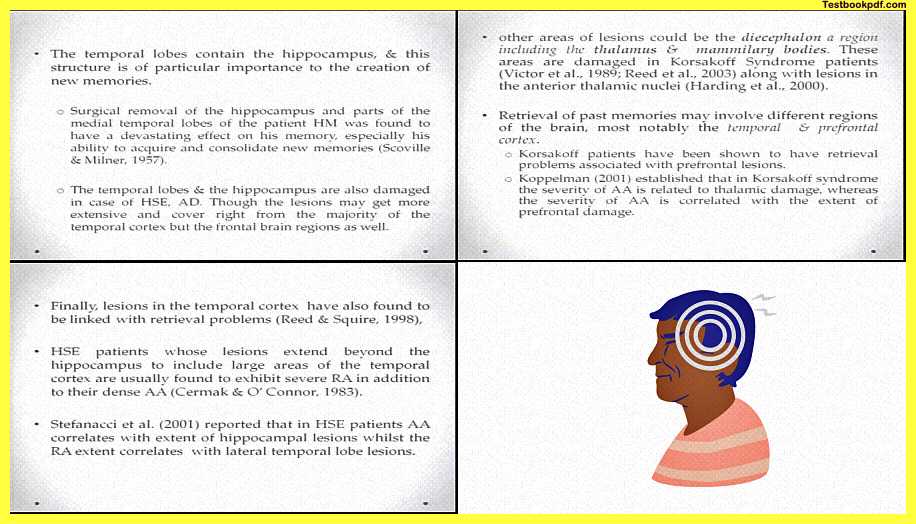
Now Korsakov patients have been shown to have retrieval problems associated with prefrontal lesions Koppelman in 2001 in his paper established that in Korsakov syndrome the severity of anterograde amnesia is related to thalamic damage whereas the severity of retrograde amnesia is correlated with with the extent of prefrontal damage so there is a typo here the severity of antioxidant is a link to thalamic damage whereas a severity of retrograde emission is linked to prefrontal damage finally lesions in the temporal cortex have also been found to be linked with retrieval problems hsc patients whose lesions extend beyond the hippocampus have been found to include large areas of the temporal cortex are also found to exhibit retrograde amnesia in addition to their dense anterograduation so hsc patients who have damage in hippocampus and large areas of temporal cortex will have both a a and r a stefanocci and colleagues in 2001 reported that in hac patients anterior grade amnesia correlates with the extent of hippocampal lesions whereas retrograde amnesia correlates with the extent of literal temporal lobe lesions.
Intact and Impaired memory System
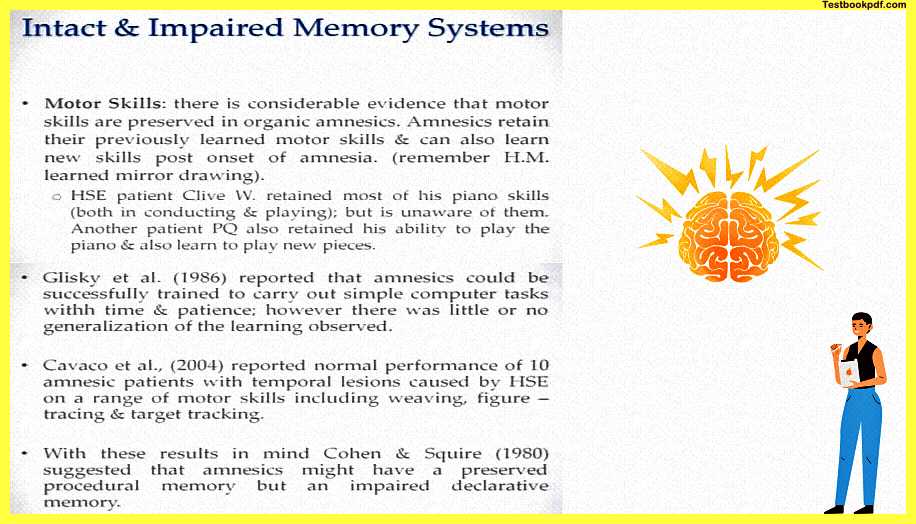
Let us now talk about we have talked about the extent of damage in organic amnesias the regions of brain that are involved in these organic initiates let us now talk about the intact and impaired memory systems what are the memory systems that are left intact even in cases of organic initials one of the first areas are the motor skills there is considerable evidence that motor skills are preserved even in organic amnesics amnestics retain their previously learned motor skills and can also learn new motor skills post the onset of amnesia if you remember h m was able to learn mirror drawing when he was taught even though he did not have explicit memory of learning mirror drawing but he could he got better at drawing those figures while looking in the mirror hcc patient clive veering we’ve also talked about him in the past articles retained most of his piano skills both in conducting the piano session and in playing the piano but he’s not really aware of them if you give him the piano he might still be able to play it but he’s not aware of the fact that he’s a piano player he was a piano player also another patient pq retained his ability to play the piano and to even the ability to learn to play new pieces and there have been a lot of experiments in these areas.
So Glisky and colleagues in 1986 reported that amnesics could be successfully trained to carry out simple computer tasks with time and patience obviously you will probably need a lot of patience to teach these people these particular skills because they will probably forget the episodes you will have to be very simple in your instructions and you have to make sure that these people are getting these articles also they observe that there will be little to no generalization of the learning of say for example if you taught a person a particular skill in a given setting it’s rather difficult for that skill or for that for the learning of that skill to generalize in a different setting so it might be that it happens in the same learning happens in one setting it stays to that setting if the person changes the setting if the person goes to.
Motor Skills
Let us say different room or different equipment the setting kind of changes and the learning is not generalizable Cavaco in colleagues 2004 reported normal performance of 10 amnestic patients with temporal regions caused by HSC on a range of motor skills including weaving figure tracing and target tracking so you are seeing all of these motor skills that people are doing the parts of memory which are referred to as procedural memory is basically found to be intact even in cases of organic amnesia.
Now with these results in the mind cohen and square suggested that amnesics might have a preserved procedural memory but an impaired declarative memory which includes both x explicit memory let us now talk about implicit memory now implicit memory again is that memory which you cannot explicitly talk about you cannot really describe those events the episodes and the facts completely but it has been shown that amnestics might still be able to retain aspects of implicit memory effects of priming or conditioning might still be observed.
Now there is a very interesting experiment that was done by Claparede in 1919 and eleven so he did that whenever he used to shake hands with the amnesic patients he would have he would hide a pin in his hand and he would actually shake hands with these amnestic patients whenever these amnesic patients would shake hands the pin will actually pain will actually stick through their skin they will experience some pain and they will take their hands off eventually but they will not have a memory of this episode after a few minutes so Claparede will come back again and do the same thing eventually what they discovered Warrington and what they discovered was these patients started stopped to shake hands with them.
so it kind of told Claparede that they are if if they are not even explicitly remembering that the pain incident but they kind of have something tells them that you should not shake hands with this person there is a pin in his hand Warrington in vice grants in 1968 showed that cossack of patients degraded when they were viewing degraded pictures of common objects or words starting with the most incomplete and they were kind of trying to rate this starting with the most incomplete version to the complete version they demonstrated that caustic of patients exhibit an increase in the ability to identify the object after a few trials again they will not have the episodic memory of seeing those pictures earlier but if you repeat this adequate number of times they will get better at recognizing these pictures graph and colleagues in 1984 they use the priming of verbal material to demonstrate the intact implicit memory in causes of patients and what they did was they actually used a task when subjects were presented with word fragments and they were asked to complete them it was found that patients responded with previously primed words.
so whatever they were responding with actually was already primed even though these people might not have a good memory of those things also their familiarity and context-based recollection might be spared in the patients of amnesia.
so mandler in 1980 suggested that familiarity and recollection represent two alternative routes to the recognition he believed that a familiarity judgment is an automatic process occurring without any conscious effort and whereas recollection is a controlled process requiring conscious effort and is deliberately carried out so this is the typical difference between a familiarity judgment and recognition.
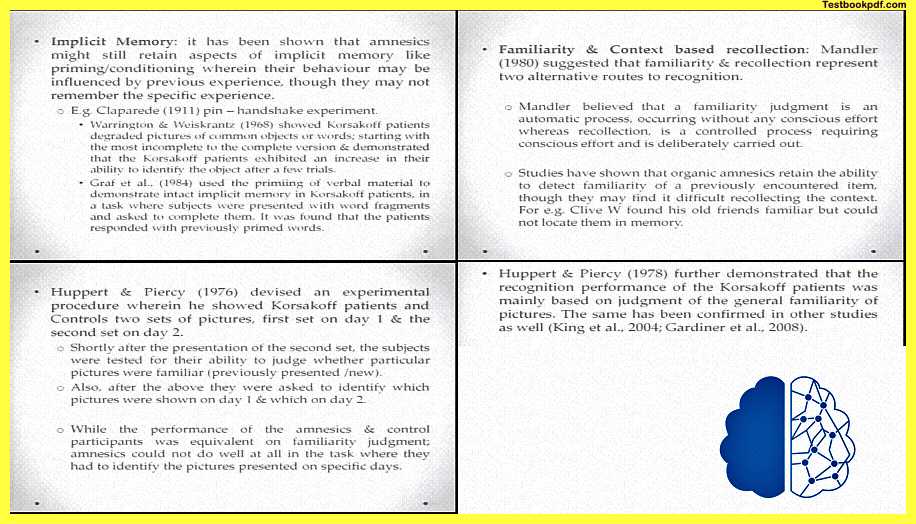
Now there have been studies which have shown that organic amnestics retain the ability to detect familiarity to an end previously encountered item you remember Claparede’s experiment something similar clive veering found his old friends familiar but could not locate them in memory could not locate seeing them so one of the interesting incidents is recalled John Kennedy who was suffering from or one of the u.s presidents who are suffering from amnesia and he would at some point in time even not recognize the stuff but he would tell his nurse sometimes that I know this person he seems to be a rather famous man but I do not recall where I have met him or what do I have to do with him.
So similarly Huppert and Piercy in 1976 devised an experimental procedure wherein they showed the how course of patients and controls they were basically showing courses of patients and controls in two sets of pictures the first set of pictures on day one and the second set of pictures on day two shortly after the presentation the second test the subjects were tested for their ability to judge whether particular pictures were familiar that is they had previously seen them or they were new so they mix this test set with the familiar pictures and some new pictures also after this above test they were asked to identify which of the pictures were shown on day one and which of the pictures were shown on day two so they not only have to judge whether these pictures are familiar or not familiar they also have to judge where in time they have seen these pictures
Now while the performance of the amnesics in control participants was equivalent on familiarity judgment amnestics could not do well at all in a loca in the task wherein they had to identify the pres the days on which these pictures were presented so Huppert and Piercy further demonstrated that the recognition performance of cossack of patients was mainly based on the judgment of familiarity it was basically so they kind of had a sense of that I have seen this picture earlier but they did not really have a sense of when had have I seen this picture so you might see the results I do not really have the figure but this kind of shows that these people performed very well on tasks of familiarity judgment but they could not locate the source of that information.
Episodic and Semantic memory
Let us talk a little bit about episodic and semantic memory because we have been talking about long-term memory here episodic memory is a memory for specific events in life semantic memory is a set of knowledge or facts that you’ve acquired over time
Now Tulving in 1989 suggested that amnesty exhibit a selective impairment of episodic memory while their semantic memories might still be intact general observation points out that indeed amnestics usually remember they are they’re fine with a normal vocabulary despite of their inability to remember any recent events in their life so they can talk and they can remember words what means those kind of things that you still have but they don’t really remember the events in their lives the episodes that have passed however other studies have shown that in some cases the semantic memory might also be jeopardized studies of course of patients have been shown to have severely impaired episodic memory along with semantic memory impairments so both kind of memory disorders are possible even though it might be said that this episodic memory is probably more impaired than maybe the semantic memory Alzheimer patients have also found to be shown impairments of both episodic and semantic memory though the former is more severely impaired.
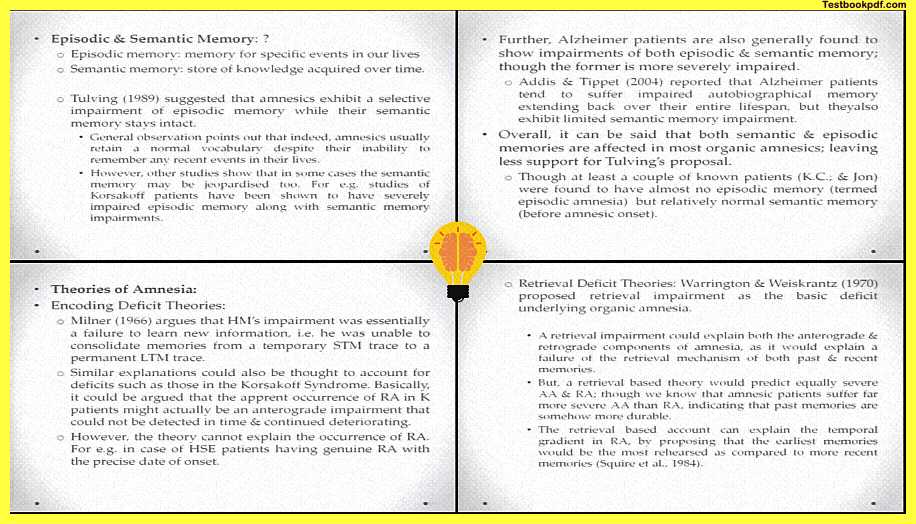
So episodic memory is more severely impaired Addison Tippett 2004 reported that Alzheimer’s patients tend to suffer impaired autobiographical memory extending over a large period of time or the entire life span but they also exhibit sometimes limited semantic memory impairment not really completely extensive as the autobiography memory impairment is but also some kind of semantic memory impairment is also generally seen overall if you kind of combine this it can be said that both semantic and absolute memory might be impaired in most organic amnesiacs leaving less support for tellings proposal that only episodic memory is damaged at least a couple of known patients say for example kc and john were found to have almost no episodic memory but a relatively normal semantic memory.
So there are obviously some cases wherein instances of intact episodic memory or intact semantic memory will be found and completely gone episodic memory will be so again some of the things one of the things I would like to tell you about disorders is that no two patients have exactly the same characteristics because no two patients might have the exact same extent of the lesion that is when you are talking about disorders and typically disorders like organic amnesia you might already come across with a huge variety of manifestations in patients a huge variety of lesion sites in patients and that is why it these studies or these theories typically built upon case studies and there is less that you can completely generalize across all patients obviously you have to make a generalization and come up with theories but those generalizations will tend to be much less accurate in case of neuropsychological patients than in some other areas.
Theories of Amnesia
Now there have been theories of amnesia encoding deficit theories Milner 1966 argues that hm’s impairment was essentially a failure to learn new information that is because he was unable to consolidate memories to form a temporary short-term from a temporary short-term memory trace to a more formidable long-term memory trace similar explanations could also be thought to account for deficits such as those happen those which happen in Korsakov syndrome basically it could be argued that the apparent occurrence of retrograde amnesia in Kosovo patients might actually be a form of an anterograde impairment that could not be detected in time and has been ensuing since quite a long time and it had been continued to deteriorate so you are kind of saying that whatever they have lost it basically was the onset is much earlier and the anterograde amnesia had set in.
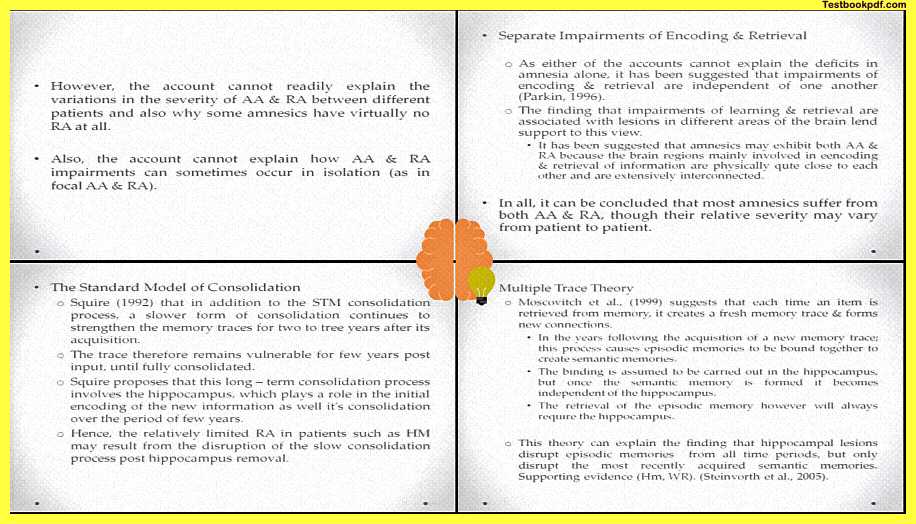
So these people have not really consolidated those memories that are when now when they look back they cannot retrieve those memories back also but if even if you take this into account the theory cannot completely explain the occurrence of retrograde amnesia in case of hse patients who have genuine retrograde amnesia with the precise date of onset so there if you remember what I was talking about HSC the onset is rather sudden so there you cannot really argue that retrograde amnesia is basically undetected and telegraphed amnesia that had been lingering on in the patient for quite some time and that is why he is not being able to recall all the previous information so it is not really a really compelling explanation so you turn to a different class of expression called the retrieval deficit explanations.
Now Warrington and vice grants in 1970 proposed a retrieval impairment as the basic deficit underlying organic amnesia so you’re saying all kinds of organic ingredients might basically be because of a retrieval deficit
now a retrieval deficit is such that it could explain both anterograde and retrograde components of amnesia because this would explain a failure of the retrieval mechanism retrieval mechanism could be failing for past events and recent events as well so if it is failing for recent events it is basically a manifesting in antelope damnation if it is manifesting in past events it is manifesting in retrograde amnesia a retrieval based theory also would predict equally severe anti-degrading retrograde amnesia though we know that there are amnestic patients who suffer from far more severe anterior amnesia than retrograde amnesia so again this theory also does not really do a very good job of explaining the incidence of both anterograde and retrogame nations the retrieval based account however can explain the temporal gradient in retrograde and measure by proposing that the earliest memories would be the most rehearsed and hence they will be compared to the most recent memories and then hence they will be recalled much better however the retrieval based account cannot readily explain the variations in the severity for a a and r a between different patients and also why some patients can have virtually no retrograde amnesia but a lot of anterior grade dementia say for example the case of hm also this account cannot explain how the in some patients they could be focal anti-degrading measure or focal retrograde dementia because if there is one explanation that fits both the amnesia both the kinds of amnesias if there is that impairment if one has to occur the other should definitely occur which does not really happen in case of focal a or r a patients.
now because both of these theories did not do a great job we could actually combine them and try and see if this can be explained so as either of the counts cannot explain the deficits in amnesia alone it has been suggested that the impairments of encoding and retrieval are independent of each other and they lead to different disorders the finding that impairments of learning and retrieval are associated with lesions in different areas of the brain have also lent support to this view so it has been suggested that Amnestics may exhibit both and degrade and retrograde amnesia because the brain regions mainly involved in encoding and retrieval are physically quite close to each other all and they are extensively interconnected.
now in all it can be concluded that most Amnestics would suffer from both a a and r a though their relative severity will vary from patient to patient and depending on the extent of injury one of these models about retrieval as we were mentioning earlier is the standard model of consolidation so square basically in 1992 says that in addition to the short term memory consolidation process a slower form of consolidation continues to strengthen the memory traces for two to three years after its acquisition the trace therefore remains vulnerable for a period of up to two to three years or for a few years post the input until it is completely consolidated square proposes that this long term consolidation process involves the hippocampus which plays a role in the initial encoding of the new information as well as its consolidation into a long term memory hence the relatively limited retrograde amnesic patients such as hm may result from the disruption in the slow consolidation process because the hippocampus has been removed there is the multiple trace theory.
Multiple Trace Theory
so Moscow in cliques in 1999 suggested that each time an item is retrieved from the memory it creates fresh memory stress and forms new connections so in years following the acquisition of a new memory trace this causes the episodic memories to be bound together to create semantic memories the binding is assumed to be carried by the hippocampus but once the semantic memory is formed it becomes independent of the hippocampus so the binding function of memory is being done by the hippocampus but after the binding is complete the hippocampus does not have a lot to do with this information the retrieval of the episodic memory however always requires the hippocampus so retrieval based deficits could generally involve some kind of hippocampal damage.
Now, this theory the multiple phase theory can explain the finding that hippocampal lesions disrupt episodic memories from all time periods but only the most recently acquired semantic memories will be deficient because the hippocampus is just recently removed there has been supporting evidence from cases like h m and w r there could be other impacts of amnesia as well.
So impaired declarative memory square argues that organic amnesia is chiefly characterized by an impairment of what is called declarative memory, memory you can talk about mandler argues that amnesia is essentially a disease of consciousness so you cannot consciously retrieve information and that is and you that is basically what is leading to the amnesia there could be impaired binding as well so kohin and eisenberm 1993 argue that the main feature of declarative memory is that it involves the creation of associative connections between different memories.
So this binding is the main thing in contrast non-declarative memory seems to be restricted to the strengthening of a single say for example learning of motor responses eichenbaum 2004 suggested that the hippocampus performs the binding function of the memory and that and whereas non-declarative memory involves the cortex and cerebrum the areas again involved in motor processing this view has been supported by a lot of imaging studies say for example rosenbaum and colleagues in 1999 found that the patient kc had severe retrograde amnesia for episodic memories and some autobiography memories but could still retrieve semantic memories before the onset they concluded that the main function of the hippocampus is to bind these memories together and organize the stored information impaired perceptual processing impaired perceptual processing while the function of hippocampus is largely assumed to involve memory storage animal studies have suggested that all it also plays a role in visual perception.
so graham and colleagues in 2008 presented some evidence which suggests that the hippocampus may also have a perceptual function in humans leading to some of their troubles some of the troubles of memory in the amnesic patients so they suggested that memory storage involves a network of perceptual representations a sort of a distributed representation which are distributed throughout the cortex and controlled and activated by the hippocampus so what is happening is damage to the hippocampus is basically going to significantly impair the retrieval of these old memories as well as the processing of new input so if hippocampus is damaged you will not be able to store incoming information in that distributed fashion also you will not be able to invoke that information that has been distributedly stored in various regions of the cortex one of the problems for this theory however is that the studies of amnestic patients have mostly failed to identify any major perceptual impairment say for example hartley and colleagues in 2007 they tested four amnesics with four with focal hippocampal lesions and only two of them showed any trace of perceptual impairment interestingly though however all four of the individuals were found to be impaired on spatial memory similarly lean colleagues in 2012 found evidence for the involvement of the hippocampus in the visual discrimination of complex scene stimuli.
Other Types of Memory Disorders
Now we can talk about some other types of memory disorders as well so impairments of short-term memory generally occur sometimes that involves a quite different pattern of bleeding brain lesions than what you saw in the case of amnesia or long-term memory impairments in Alzheimer’s disease patients may sometimes show a severe working memory impairment chiefly involving the executive functions alerting orienting and inhibiting concussion amnesia.
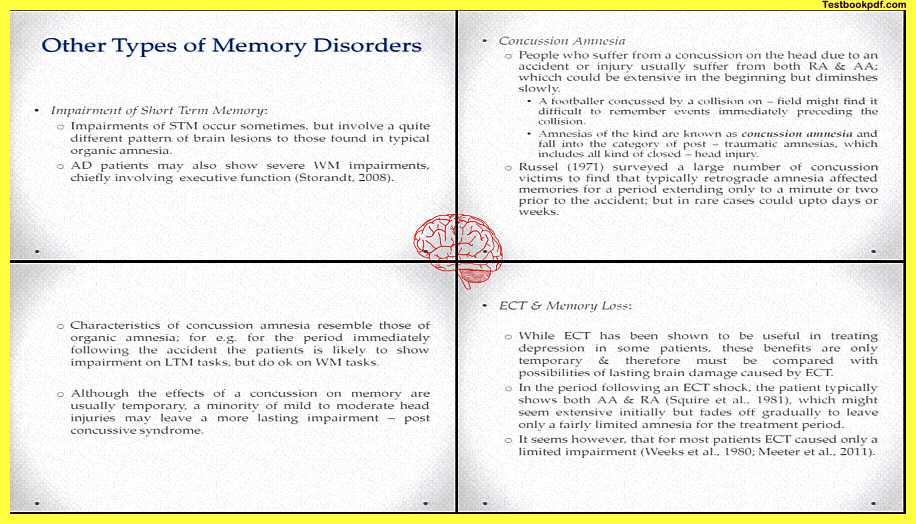
Concussion Amnesia
people who suffer from concussion on the head due to a accidental injury on the top of the head basically will suffer from both retrograde and antarctica amnesia which could be extensive in the beginning just after say for example you banged your head or somebody’s hit you on the head but kind of diminishes with time a footballer conquered by a collision on the field might find it difficult to remember events just leading to the concussion but will eventually regain those memories back after a particular period of time these kind of amnesias are known as concussion amnesias which fall into the category of post traumatic amnesia and includes almost all kinds of brain injuries possible head injuries basically russell in 1971 surveyed a large number of concussion victims and to find that typically retrograde amnesia affects the memories for a period extending or leading up to a minute or two till this concussion or accident happened but in rare cases up to days or weeks could also be found a characteristics of concussion amnesia resemble quite a bit of organic amnesia as a period immediately following the accident the patients are likely to show impairments in long-term memory task but they do slightly ok on working memory tasks although the effects of concussion amnesia are on memory are usually temporary a minority of mild to moderate head injuries may leave a more lasting impairment we have talked about ECT and memory loss.
ECT and memory loss
So ECT has been shown to be useful in treating depression in some patients these benefits have been found to be only temporary and therefore must be compared with the possibilities of lasting brain damage so if a person has received extensive ECT treatment it might actually lead to lasting brain damage in a period following the ECT shock the patient typically shows both a a and r a which might seem extensive initially but generally fades off with the course of time however it seems that for most patients ECT only causes a limited impairment a recent review of previous ECT studies conducted by reed and benthal in 2010 they concluded that ECT treatment produces no lasting benefits but it does cause significant memory loss in some patients so in that sense you can actually say that you have to evaluate whether ECT really benefits the patient so much or it kind of leads to typical impairments which will anyways fade off after a period of time.
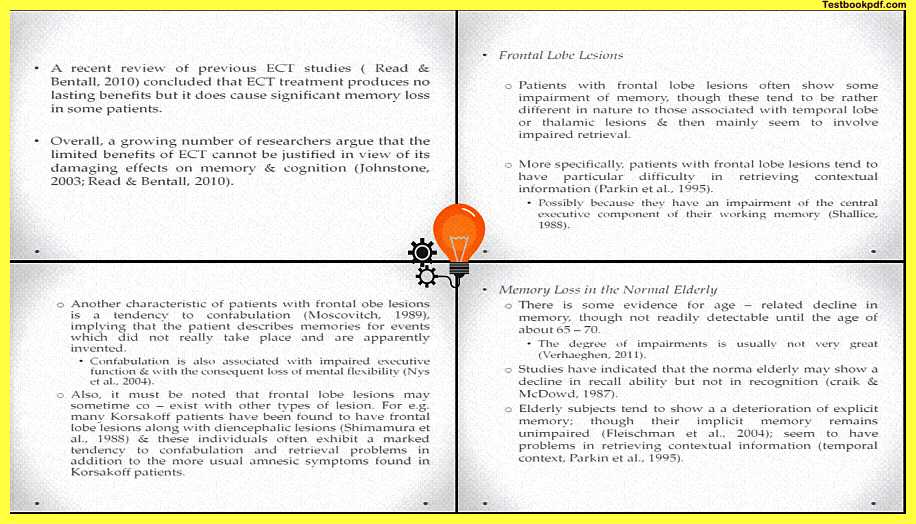
Frontal Lobe Lesions
so it in that in that sense it cannot be justified to use ECT to treat a large number of patients with frontal lobe lesions also often show some kind of impairment of memory though these tend to be rather different in nature and associated with different in comparison to lesions of the temporal lobe so these lesions basically say for example the temporal ablations could be thalamic lesions or otherwise more specifically patients with frontal lobe lesions tend to have particular difficulty in retrieving contextual information placed in a particular context possibly because they have an impairment of the central executive component of their working memory so that is again something which was shared said by chalice in 1988 another characteristic of patients with frontal lobe lesions is a tendency of confabulation so implying that the patient describes memories for events which did not really take place and are apparently invented.
so if you talk about patients with frontal lobe lesions they might come up with descriptions of events that have not really occurred or they might be mixing everything they might be a strand of event that is correct but everything else is made up so com confabulation this concept is termed as confabulation and confabulation has been found to be associated with impaired executive functioning and with also a consequent loss of mental flexibility also it must be noted that frontal lobe lesions may that is may somehow coexist with other kinds of lesions as well for example many cortisol patients have been found to have frontal lobe lesions along with diencephalic lesions and these individuals often exhibit a marked tendency of confabulation and then retrieval problems are also there in addition to their usual amnesic symptoms we can we have been talking about amnesia per se but we can also talk a little bit about the memory loss in normal elderly people there is some evidence for age-related decline in memory though not really readily deductible until till the age of 65 or 70. the degree of impairments is usually also not very great so they might be general forgetting and it might be slightly more than people experience at younger ages but it’s not as severe as saying for example in patients of amnesia studies have indicated that normal elderly people may show a small a relative decline in their recall ability but not really in their recognition.
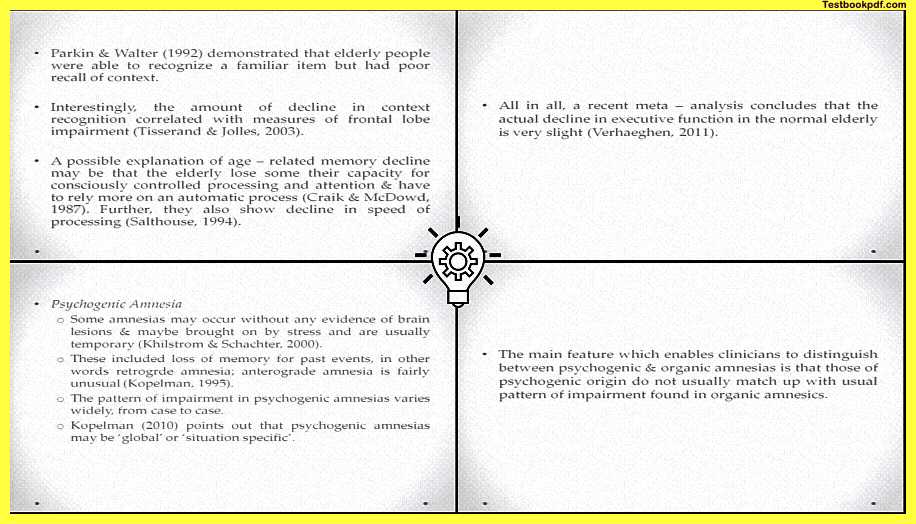
So if you kind of have a queue in which they do not really have to recall information they might still be able to deal with this information easily elderly subjects have been elderly subjects have been shown have been have tended to show a deterioration of explicit memory so if you ask them explicit facts those kind of things might be deficient but they their implicit memory remains rather unimpaired they seem to have problems in retrieving contextual information or information from a particular temporal context so this happened at that point in time i was doing this that kind of of information is generally impaired parkin in Walter in 1992 demonstrated that elderly people were able to recognize a familiar item but they would have a poor recall of context where did i meet this person i know this person but i don’t know where i met this guy interestingly the amount of decline in the context recognition has been found to be correlated with the measures of frontal lobe functions frontal lobe impairment.
so if you take a test of frontal lobe functionality with these people and the amount of decline that is experiencing context recognition they have been found to be correlated with each other a possible explanation of these kinds of age-related memory declines may be that the elderly people lose some of their capacity to control of consciously controlled processing so they do not have this total grasp on where to pick up particular information from and so that they are kind of now relying more and more on an automatic or a rather automatic process so that some information that comes automatically is easy and easily retrievable is there but if the if you ask them to consciously recall some information that might be slightly deficient all in all a recent meta-analysis concludes that the actual decline in executive function in the normal elderly is rather slight it’s not too much.
Psychogenic Amnesia
So we can talk about psychogenic amnesia as well some amnesias might occur without any evidence of brain lesions and may be brought on by stress tension and are usually temporary these include the loss of memory for past events and in other words, retrograde amnesia anterior initial is rather unusual it does not do not really happen with the psychogenic cases the pattern of impairment psychogenic amnesia varies widely from case to case and Koppelman 2010 points out that the psychogenic amnesias may be global or situation-specific it could be either of the cases the main feature which enables clinicians to distinguish between psychogenic and organic initiates is that those of psychogenic origin do not usually match up with the kind of impairments that are experienced by organic amnesiacs.
Rehabilitation
we can talk a little bit about rehabilitation while we are winding up so that there are a large number of ways in which you would like to help these people help the organic energy so that they can lead a slightly more meaningful life you can come up with ways to help them cope with this loss of information and all of these come under the umbrella term of rehabilitation so, for example, one of the things could be maximizing memory information.
so it might be maximizing memory performance so it might be useful to advise amnesic patients or even the elderly to pay more attention to the input to process it more attentively repeat what is said to them to organize the information very in a neat way and make meaningful associations between new input and the items that they have already stored in their memory Wilson in 2004 suggests that amnesics learn one thing at a time and one has to keep the input very simple avoid jargon and use of long words also they would perform better if the learning is not context specific if you are not treating them training them in a particular setting because this is not going to generalize to other settings as we have already mentioned and music also generally benefit through a spaced rather than mass learning session.
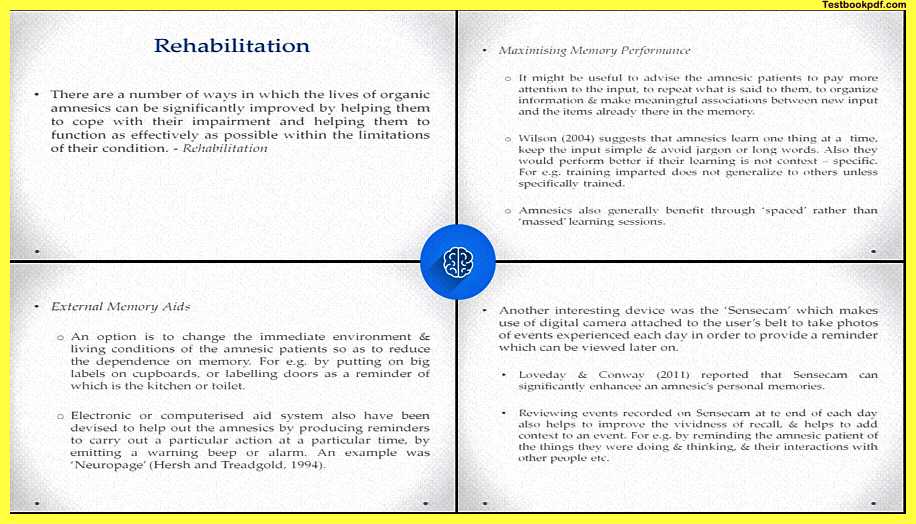
So if you make them learn small information in spaced-out sessions they might be able to retain that information much better as compared to if you give them a huge chunk of information at one time external memory aids have been found to be useful in these Amnestics say for example an option is to change the immediate environment and the living conditions of the amnesic patients so as to reduce the dependence on memory so you do not have to recall everything and then work say for example if you might have seen this movie called memento or the Indian version of this movie called Ghazni wherein this person had all of those cues written all over his body so that he could remember that information which was relevant to recall so putting big labels on the cupboards labeling doors as kitchen toilet etcetera might be helpful.
Nowadays we also have the luxury of electronic or computerized eight systems which have been devised to help out the amnesics by producing reminders or carrying for carrying out particular actions or say for example reminding them of their medicines etc similar example was Neuropage which was worked upon by harsh and tread gold and was found to be very useful another interesting device that has come out recently was the sense cam which makes the use of a digital camera attached to the user’s belt to photograph all the happenings of the day love day in Conway have found 2011 that Sensecam can significantly improve the amnestic person’s personal memory so whatever is happening at the end of the day the amnesty person is sitting in his room and going through all the photographs of the day and attaching some kind of temporal context to them some kind of information to them that will will be relevant to recall those events let us say on a later day so this is all about amnesia we have been talking about amnesia organic psychogenic and other causes that may lead to memory disorders thank you.
Read also:
Disorders of Perception and Attention Pdf
